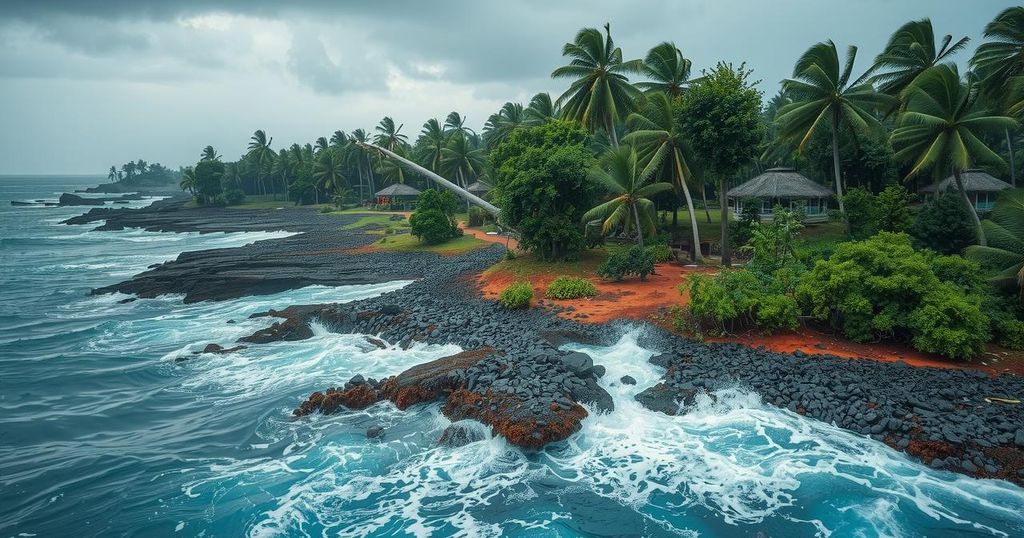World news
AFRICA, AL JAZEERA, ATLANTIC OCEAN, BBC, CHI, CHIDO, DISASTER RELIEF, EMERGENCY RESPONSE, EMMANUEL MACRON, EUROPE, FRANCE, FRANCOIS DUROVRAY, GUY TAYLOR, HUMANITARIAN AID, INTERNATIONAL AID, MAHORAIS, MOZAMBIQUE, NATURAL DISASTER, NATURAL DISASTERS, NEW YORK TIMES, PEMBA, SERVICE, SOUTHWEST INDIAN OCEAN BASIN, UPI
Fatima Khan
0 Comments
Cyclone Chido Causes Destruction in Mayotte and Mozambique, Mobilizing Relief Efforts
Tropical Cyclone Chido struck Mayotte on December 15, killing 14 individuals and causing extensive damage before impacting Mozambique. With winds reaching 124 mph, the cyclone destroyed homes and facilities, affecting the livelihood of many. Relief efforts are underway as the French government mobilizes resources to assist the impacted regions.
On December 15, Tropical Cyclone Chido made landfall in Mayotte, a French territory in the Indian Ocean, resulting in significant destruction and loss of life. The cyclone struck with sustained winds of 124 mph, leading to at least 14 fatalities. Following this, the storm continued to impact Mozambique, where winds reached 115 mph. In Mozambique, severe damage was reported, particularly to homes, schools, and health facilities, prompting humanitarian responses. UNICEF’s Guy Taylor highlighted the urgent need for maintaining essential services amid the devastation.
Chido formed within the Southwest Indian Ocean Basin earlier in the week and initially passed near Madagascar before affecting Mayotte, which encompasses two islands and approximately 320,000 residents. The population of Mayotte, who primarily reside in precarious housing, faced significant displacement, with tens of thousands losing their homes. The French government has mobilized relief efforts, deploying emergency supplies and personnel to assist affected areas. President Emmanuel Macron expressed solidarity with the residents of Mayotte and affirmed ongoing support from state services. At present, efforts to restore air travel have commenced, with Pamandzi airport prepared to receive military aircraft for relief operations.
As forecasts predict that Cyclone Chido is likely to weaken, it remains paramount for local and international authorities to coordinate effective recovery and support strategies to assist those impacted. The prioritization of essential services and immediate relief efforts will be crucial in the aftermath of this catastrophic event.
Cyclones and tropical storms pose significant threats to coastal regions, and the current Southwest Indian Ocean Cyclone season has witnessed the formation of several intense storms. Tropical Cyclone Chido represents the third named storm of this cyclone season, illustrating the ongoing climatic patterns affecting Southeast Africa. Cyclones can lead to substantial damage due to high winds and flooding, which can severely impact communities, particularly in under-resourced areas. The specific situation in Mayotte and Mozambique has been exacerbated by existing socioeconomic challenges; both regions contend with informal housing structures that are highly susceptible to extreme weather events. The geography of Mayotte, being an island territory, further complicates rescue and recovery efforts after such natural disasters. Understanding the regional history and climate vulnerability is essential when addressing the humanitarian response to Cyclone Chido.
In summary, Tropical Cyclone Chido has caused devastating consequences in Mayotte and Mozambique, resulting in loss of life and widespread destruction of infrastructure. The immediate response by local and international authorities is critical to ensuring the provision of essential services and support for displaced populations. With proper coordination and timely assistance, there is hope for recovery and rebuilding in the affected areas as the storm subsides.
Original Source: www.upi.com




Post Comment